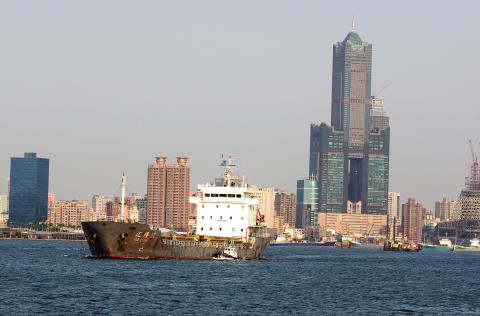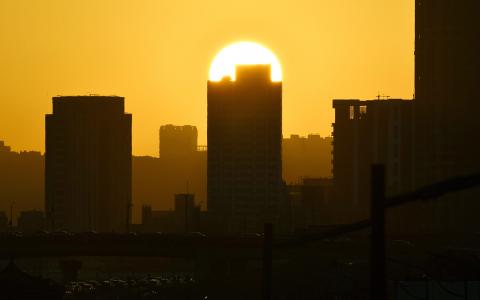I dismissed the idea at first. Over a picnic in south London’s Brockwell Park last May my friend Tom asked whether I had ever considered leaving the UK behind and continuing my football journalism career abroad.
“Nice thought, mate,” I replied. “But I can’t see it happening. How would I make it work? Besides, I’d miss you too much.”
That last bit remains true, but the conversation got me thinking, and a few months later I became a digital nomad — loosely defined as someone who uses the internet to work remotely without having a fixed home base.

Photo: EPA
It’s the best decision I have ever made.
The number of digital nomads in the world today is hard to ascertain: there is some overlap with groups such as remote workers, long-term travelers and expatriate online workers. How often do you have to be on the move to be considered a nomad? Do all your earnings have to be derived from the internet, or can you have other sources of income?
A study last year by research firm MBO Partners found that 4.8 million US citizens identified as digital nomads, and a Gallup poll two years earlier revealed that 43 percent of employed Americans spend at least some time working outside the traditional office environment. In the UK, the Trades Union Congress calculated that the number of remote workers rose by almost 250,000 between 2005 and 2015.

Photo: AFP
FREED FROM THE OFFICE
Helen Barlow is a freelance translator from Liverpool who has lived and worked in 15 countries since 2011. The freedom to travel and increased flexibility in working hours were the key factors behind her decision to take her job on the road.
Barlow feels as if she is “on holiday every day.”
“Every day is exciting, and there’s always a new experience around the corner,” she says of a lifestyle which has taken her to Europe, South America and Asia. “I feel like I’m constantly on holiday, and there’s no such thing as the Monday morning blues, or the humdrum of a daily commute. Life becomes simpler and more streamlined as you realize you don’t need many material possessions. And there’s no keeping up with the Joneses.”
Pieter Levels, the founder of nomadlist.com — a Web site that ranks towns and cities by their nomad-friendliness based on factors such as cost of living, internet speed and entertainment options — estimates that there will be a billion digital nomads by 2035. That is a bold prediction, but in its support he cites the rise of freelance work, the increasing affordability of air travel and the decline in home ownership and marriage.
Now an industry has sprung up to serve digital nomads. WeWork, a global network of shared office spaces, will soon have 649 locations in 113 cities from China to Chile, Poland to Peru. Selina is a community-focused Web site offering 22,000 beds in private rooms and dorms, mainly in Latin America, plus a few European cities. Remote Year organizes work and travel programs to destinations such as Cape Town and Kyoto.
There are also dedicated Web sites to help location-independent workers find employment, and an abundance of Facebook groups in which members exchange information and advice. The Estonian government is among those on board, offering the world’s first visa for digital nomads.
I was reluctant to label myself a digital nomad before I arrived in Ho Chi Minh City, the largest city in Vietnam — still known as Saigon by almost everyone who lives here. I found the tag a little pretentious, conjuring Instagram influencers sipping coconut water next to an unopened MacBook on a Bali beach.
INTERNET ITINERANT LIFESTYLES
However, since arriving in January, I have met digital nomads from all walks of life. Jobs such as computer programming, copywriting, content marketing and web development are most conducive to the Internet-itinerant lifestyle, but I have also come across researchers, accountants and fellow journalists. They tend to be male, in their 20s or 30s and from western Europe, the US or Australia, but I have met a Taiwanese social media manager and a Brazilian graphic designer too.
Danish Soomro has lived in some 50 cities in 20 countries since 2015. He helps run a Facebook group, Digital Nomads Around The World, which has 105,000 members. He is also the founder of Digital Nomads Nation, an online resource providing services from city reviews and job listings to banking advice and even dating.
“We live in a project-based economy, and more digital work is becoming available in more occupations, creating opportunities for people to go nomadic,” says the Canadian-Pakistani, who is currently based in Greece. “Life goals are also different. Millennials tend to favor experiences over possessions, which suits this kind of lifestyle.”
Greg Lea at work on his travels. He has never regretted his decision to take his job round the world with him.
The ability to travel and connect with people all over the world while still earning a living is my favorite thing about being a digital nomad. As Bill Nye, the US “science guy,” once said: “Everyone you will ever meet knows something you don’t.”
The constant sense of adventure that stems from being far from home is another plus. Many of my days here are not too dissimilar to my life in London — filing articles, editing copy for football Web sites The Set Pieces and FourFourTwo, consuming too much caffeine — but the unfamiliarity means there is excitement in the most mundane tasks, such as ordering lunch or taking a (motorbike) taxi. Using a popular co-working space also offers me the chance to regularly meet new people, and there is a thrill in not knowing who might walk through the door each day. Alas, no fellow Crystal Palace fan has yet shown up.
NOT FOR EVERYONE
It is not all fun and games, however, and the lifestyle would not suit everyone. The lack of permanence can be draining. Many digital nomads actively avoid becoming too attached to people or places, as they will soon be on the move.
“I’ve had solitary times, especially when hopping from place to place in a short period, as I didn’t give myself the chance to commit to new friendships or activities, Barlow says. “Maintaining a romantic relationship with someone who has more commitments at home and does not share the same freedom is another challenge. On the work side, battling dodgy wifi connections isn’t ideal when you’ve got deadlines.”
Pablo Genest, who quit his studies in France to begin building an online maths course from Vietnam, says: “You need to have a lot of discipline to live this way. My mum was a bit concerned that I was wasting my potential, which is understandable because a lot of older people don’t know what digital nomadism is. I get why she was apprehensive, but being able to work from anywhere is a real blessing.”
I could not agree more. I spent a few weeks in Japan in April, and plan to visit China, South Korea and Malaysia before the year is out. I am not sure how long I will stay in each place, and Saigon has already occupied a big enough place in my heart to make a return highly likely, but the opportunity to explore new places and continue to try and explain Brexit is too good to resist.
I owe my friend Tom a beer.

June 9 to June 15 A photo of two men riding trendy high-wheel Penny-Farthing bicycles past a Qing Dynasty gate aptly captures the essence of Taipei in 1897 — a newly colonized city on the cusp of great change. The Japanese began making significant modifications to the cityscape in 1899, tearing down Qing-era structures, widening boulevards and installing Western-style infrastructure and buildings. The photographer, Minosuke Imamura, only spent a year in Taiwan as a cartographer for the governor-general’s office, but he left behind a treasure trove of 130 images showing life at the onset of Japanese rule, spanning July 1897 to

One of the most important gripes that Taiwanese have about the Democratic Progressive Party (DPP) is that it has failed to deliver concretely on higher wages, housing prices and other bread-and-butter issues. The parallel complaint is that the DPP cares only about glamor issues, such as removing markers of Chinese Nationalist Party (KMT) colonialism by renaming them, or what the KMT codes as “de-Sinification.” Once again, as a critical election looms, the DPP is presenting evidence for that charge. The KMT was quick to jump on the recent proposal of the Ministry of the Interior (MOI) to rename roads that symbolize

In an interview posted online by United Daily News (UDN) on May 26, current Chinese Nationalist Party (KMT) Chairman Eric Chu (朱立倫) was asked about Taichung Mayor Lu Shiow-yen (盧秀燕) replacing him as party chair. Though not yet officially running, by the customs of Taiwan politics, Lu has been signalling she is both running for party chair and to be the party’s 2028 presidential candidate. She told an international media outlet that she was considering a run. She also gave a speech in Keelung on national priorities and foreign affairs. For details, see the May 23 edition of this column,

On the evening of June 1, Control Yuan Secretary-General Lee Chun-yi (李俊俋) apologized and resigned in disgrace. His crime was instructing his driver to use a Control Yuan vehicle to transport his dog to a pet grooming salon. The Control Yuan is the government branch that investigates, audits and impeaches government officials for, among other things, misuse of government funds, so his misuse of a government vehicle was highly inappropriate. If this story were told to anyone living in the golden era of swaggering gangsters, flashy nouveau riche businessmen, and corrupt “black gold” politics of the 1980s and 1990s, they would have laughed.